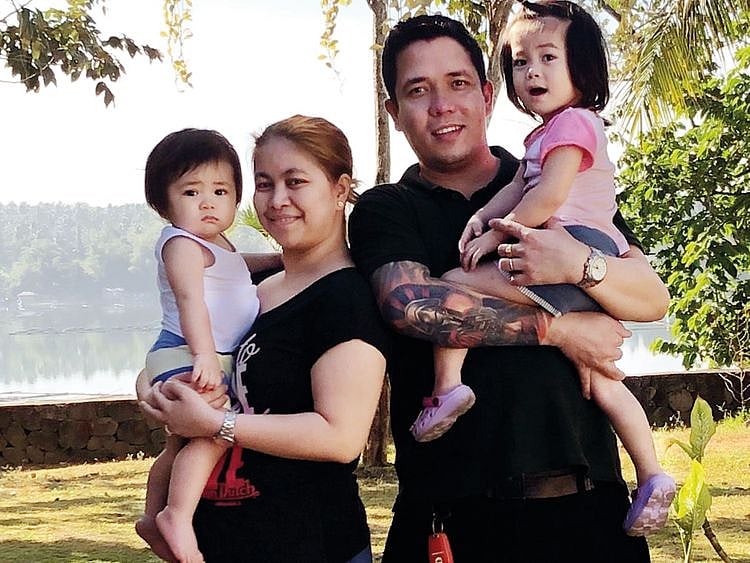Filipino man in UAE donates kidney to his wife in act of selfless love
Live donor transplant was successful, with couple recovering well at hospital n Abu Dhabi

Abu Dhabi: A Filipino man in Sharjah has donated one of his kidneys to his wife to save her life in an inspiring act of selfless love.
Frederick Valiente, 38, a father-of-two, donated a kidney to his wife, 37-year-old Maria Theresa Coronel, in a complex eight-hour live transplantation surgery at the Burjeel Medical City in Abu Dhabi, the hospital said in a statement on Thursday, March 9.
The couple’s journey highlighted their journey on the occasion of World Kidney Day, which is marked globally on March 9.
End-stage disease
According to a statement released by the hospital, the past year was challenging for the family as Coronel was suffering from end-stage kidney disease. Coronel had to manage dialysis sessions thrice a week, which presented multiple inconveniences for the small family, who have lived in Sharjah for a decade. The couple’s decision to finally explore alternative options was supported by Coronel’s kidney doctor, which saw them seeking a second opinion with the kidney transplant team at Burjeel Medical City.
After completing the necessary investigations and reviewing the test results, Dr Venkat Sainaresh Vellanki, director of transplant nephrology at the hospital, and Dr Rehan Saif, transplant surgery director, found Coronel to be medically fit for kidney transplantation surgery. They then encouraged her to speak to her family for about seeking a live donor organ.
Also Read
Women in renewables industry: Know their thoughts on International Women's DayWatch: “This is absolutely amazing!” UAE astronaut Sultan Al Neyadi shares video of his first views of Earth from ISS Cupola Expo City Dubai gives tribute to women of the worldRamadan expected to begin on March 23 in Arab countries20 safe riders in Dubai to get Dh20,000 in rewards from RTA’s new initiativeTesting times
The search for a donor first led to Coronel’s niece, who was willing to be a kidney donor for her aunt, but proved not be a match.
When the hope of finding a biologically related donor was fading, Valiente stepped forward to donate one of his kidneys to his wife, to whom he has been married for eight years. Upon assessment, he turned out to be a good donor match for her.
Selfless decision
Asked about his unselfish decision, Valiente said he had only done what any husband would under the circumstances.
“I love my wife and would do anything for her. I’m glad I was able to help her in some way to bring her and our family back to normal life again,” he said.
Prior to the transplant, Dr Vellanki and his team evaluated Coronel’s history with kidney disease.
“Coronel’s niece and husband volunteered for initial evaluation [to donate a kidney] and her husband, who had a compatible blood group with her, was found to be a suitable match,” the doctor said.
Challenging surgery
The procedure included the donor operation, a laparoscopic live donor right nephrectomy, and the recipient operation, a live donor renal transplant. According to Dr Saif, the surgery was challenging due to the shorter length of blood vessels in the right kidney compared to the left kidney.
“Both surgeries took place simultaneously in a staggered fashion to keep the ischemia time — time that the kidney remains outside the body between being removed from the donor and transplanted into the recipient — to a minimum. The donor surgery was performed using a minimally invasive method — laparoscopically using 3D technology camera. The renal graft was then prepared and transplanted into the recipient wherein the blood vessels (artery and vein) and ureter are anastomosed [or cross-connected] to the recipient’s blood vessels and urinary bladder,” the doctor explained.
Dr Ramamurthy Ganesan Baskaran, consultant transplant anaesthesiologist, and Dr Nicholas Wyon, consultant intensivist at the hospital, were also a part of the transplant team.
Successful transplant
According to the doctors, the couple is now recovering well. Coronel is showing good graft function, and the couple’s post-operative recovery has been uneventful, the medical team said. The family has received an outpouring of support from the medical, nursing and technical staff at Burjeel Medical City.
“We are so blessed and thankful. It’s a miracle that [Valiente] and I get to share this journey. My husband is my hero. He saved my life, and I am forever grateful,” Coronel said.
For his part, Valiente is happy with the treatment they have received.
“We were lucky to come to Burjeel Medical City for my wife’s surgery. The doctors and other transplant team members were very professional, sensitive, and supportive of our needs through this difficult time. I am very thankful to God and the doctors of this hospital,” he said.
Be a donor
The couple’s transplant story once again highlights the importance of organ donation. To encourage organ donation, the UAE has introduced National Program for Donation and Transplantation of Human Organs and Tissue, known as Hayat.
Kidney failure
Kidney diseases rank among the top 10 causes of the years of life lost in the GCC and Middle East and North Africa region. As of 2016, kidney diseases are widely prevalent, with an estimated one in 10 individuals being affected. It is estimated that by 2040, kidney disease will rank among the top five causes of mortality.
Worldwide, the most common causes of chronic kidney diseases (CKD) are diabetes mellitus and hypertension. Other causes include glomerulonephritis, lifestyle factors such as obesity, smoking, genetics, geographical area predisposition, low socioeconomic status, medication abuse, poor work conditions, unhealthy dietary habits, and addictions.
Kidney diseases are silent killers, which can largely affect one’s quality of life. But there are several ways to reduce the risk of developing kidney disease, Dr Vellanki and Dr Saif said.
Kidney health tips
Network Links
GN StoreDownload our app
© Al Nisr Publishing LLC 2026. All rights reserved.